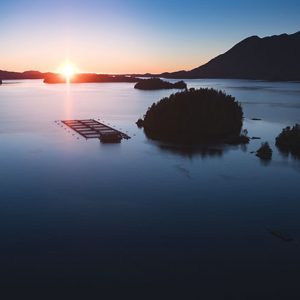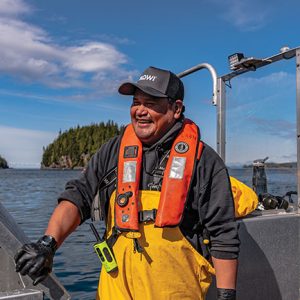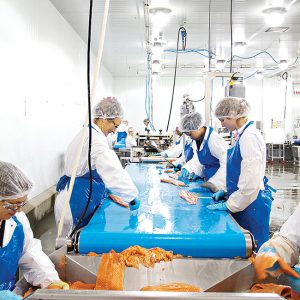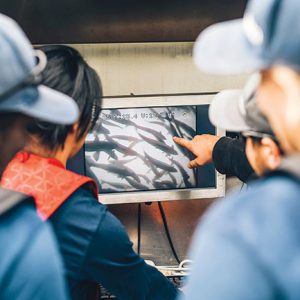
‘We’re in a panic mode’
February 12, 2021
By
Liza Mayer
Frustrated and angry, mayors of five BC coastal towns say decision is a defeat for science, food security and job creation in rural areas
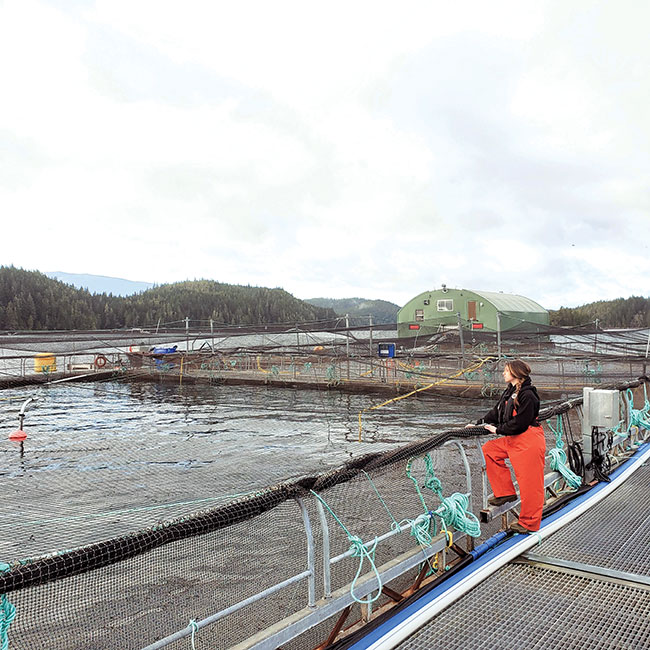 Kaitlin Guitard, water quality technician at Mowi, wonders what the future holds for her and the hundreds of British Columbians relying on the farmed salmon industry for their livelihood
Kaitlin Guitard, water quality technician at Mowi, wonders what the future holds for her and the hundreds of British Columbians relying on the farmed salmon industry for their livelihood There was no shortage of grim news for Port McNeill Mayor Gabriele Wickstrom. Her town of 2,200 people has just come out of a months-long, financially devastating forestry strike in February 2020 when the COVID-19 pandemic hit, dimming hopes of economic recovery.
Wickstrom estimates that roughly 80 percent of Port McNeill’s population depends on British Columbia’s $7-billion forestry sector for their livelihood. Others rely on the province’s $1.6-billion salmon aquaculture industry.
On December 17, BC’s salmon farming community received bad news: the 19 fish farms in the Discovery Islands will be phased out over the next 18 months because the indigenous communities where those farms are located don’t want them there, said Fisheries and Oceans Canada (DFO) Minister Bernadette Jordan.
The Discovery Islands is an archipelago near Campbell River, the town where almost one-quarter of BC’s aquaculture workforce is based. Three of the world’s leading aquaculture companies – Mowi, Cermaq and Grieg Seafood – have their North American head offices there. The town is also home to two small independent farms, Yellow Island Aquaculture and Salt Stream Aquaculture.
The three global players have some farms in the Discovery Islands: Mowi’s 15 farms account for 30 percent of its annual harvest in BC; Cermaq’s three account for 20 percent of its Canadian production; and Grieg Seafood has one, accounting for 12 percent of its total harvest biomass.
None of those salmon farms are in Port McNeill but the news isn’t any less troubling for Wickstrom. She says the economic benefit that trickles down to neighboring communities like hers – and the losses if the closures move ahead – underscore the magnitude of this decision.
“There’s not a lot of people directly employed in aquaculture but there are a lot of spin-off businesses. In fiscal 2019, Cermaq spent just over $3 million with about 20 individual businesses and contractors in our community. That is just Cermaq, which actually has a smaller footprint than Mowi, so I would say that figure could easily be doubled, maybe even almost tripled,” the mayor says.
Wickstrom is one of five mayors in the North Island region of Vancouver Island who now question their community’s future, especially in a global pandemic.
Like Port McNeill, the Village of Sayward depends mainly on logging. Eleven of the village’s 300 residents work in aquaculture. As important as the jobs are the industry’s contributions in helping Sayward thrive as a community, says Mayor Mark Baker.
Over the past decade, he says Mowi has contributed $407,000 to the local nonprofit that manages and maintains The Wharf at Kelsey Bay. The salmon producer spent more than $200,000 with local contractors in 2019-2020, and for years has provided generous supply of salmon during community events, such as Canada Day celebrations, the RCMP bike rodeo and Christmas dinners.
“I know the money doesn’t sound like a lot but given that we have just over 300 people in our community, it is a lot of money,” says Baker.
A defeat for science
“The announcement caught us completely off guard,” says Campbell River Mayor Andy Adams. “It was completely irresponsible and completely contrary to the latest Cohen Commission and very self-serving.”
The Cohen Commission was established in 2009 to address concerns that salmon farms are impacting the wild salmon population in BC’s Fraser River. One of the Commission’s recommendations was to abolish the 19 farms – which are on a salmon migration route in the Discovery Islands – by September 2020, unless there’s proof they pose only a “minimum risk of serious harm to the heath of migrating Fraser River salmon.”
Results of DFO’s own scientific assessment, released this past September, showed the farms present only “minimal risk” to wild Fraser River salmon stocks.
This kind of stipulation from the DFO is one of two new requirements that applicants for new fish farm licences – and renewals of existing ones – must comply with beginning June 2022. The second criterion is consent from local First Nations in whose traditional territories the farm sites are located.
DFO said it consulted with the seven indigenous communities – the Homalco, Klahoose, K’ómoks, Kwaikah, Tla’amin, We Wai Kai and Wei Wai Kum – in the Discovery Islands in making the decision. When asked by this publication whether consent from indigenous communities trumps science when it comes to policy decisions, Minister Jordan’s Office refused to comment, citing the judicial review of the Minister’s decision filed by Mowi and Cermaq last January.
“I can’t speak enough as to how disappointed we are that the Minister made the decision without taking into consideration the findings of that report,” says Adams.
Uncertainty could blunt BC’s edge
The lack of clarity around how the DFO Minister weighs her policy decisions could affect investments into the salmon industry in BC, where the federal government/DFO is the primary regulator (provincial governments are otherwise the primary regulators in other provinces).
A study by consultancy firm RIAS Inc says that salmon farmers in BC are willing to invest $1.4 billion in innovation, new technology, and infrastructure through 2050 if the Canadian federal and provincial governments are able to provide a “predictable policy approach.”
The DFO decision is incompatible with that and raises more questions: “If the federal government along with our Member of Parliament locally are adamant to remove fish farms from the west coast of Canada, does that also pose a threat to all the fish farming and aquaculture industry in Newfoundland and Labrador as well as the rest of the east coast? And are they driving the industry out of the country completely?” asked Adams.
Adams may be justified in asking those questions because the Discovery Islands farms’ phase-out echoes a decision made in December 2018 over 17 salmon farms in the Broughton Archipelago in BC. In that move, the BC provincial government and the three First Nations in the Broughtons decided to not renew the leases of 17 salmon farms owned by Mowi and Cermaq. Ten of the farms will cease operations by the end of 2022, while the rest could continue if First Nations-industry agreements and valid DFO licences are in place by 2023.
A salmon industry analyst says this uncertainty could make the east coast of Canada, as well as Norway, more attractive as destinations for investments.
“I think that the companies in Canada are now more eager to grow on the east coast rather than west,” says analyst Christian Olsen Nordby of the European financial services and research firm, Kepler Cheuvreux.
“We have seen that Mowi for example will fight the decision, and they can’t be happy about losing 10,000-12,000 tonnes. Canada has had relatively high costs for a while now and combined with low salmon prices during COVID-19, profitability has been weak. That doesn’t automatically make closed-containment farming extremely attractive because it is expensive. So I understand that the farmers now want to grow volumes on the east coast.”
He says this will lead to lower total production growth from Canada and more investments directed towards Norway.
“Norway has a more stable growth regime and offshore farming appears more interesting for several farmers rather than geographical expansion. Also land based and post-smolt seems more interesting for many farmers given the relatively low stability from the Canadian government, combined with the relatively high costs in Canada,” Nordby says.
‘Hear us’
Minister Jordan’s Office has neither made any statement nor responded to the countless open letters from the industry and the community asking her to reassess the decision.
“It’s nice to have communication with the seven First Nations (in the Discovery Islands). But there was no consultation, no discussion, with us as the leaders of our communities. We need to be part of the equation in discussions. It’s too important to our livelihoods in our communities,” said Mayor Brad Unger of Gold River, where Grieg Seafood has been operating a hatchery for the past 20 years.
The hatchery on a former mill site employs 24 employees full-time, including First Nations, says Unger. “They just did a $20M to 25M upgrade of their facilities. On the farm site, there’s 20-plus people working there — full-time jobs, pension jobs, career jobs.”
Unger estimates that Grieg Seafood’s long-term agreement with the village of Gold River brings in tax dollars of between $80,000 and $100,000 a year. “For a small community of 1,300 people, that’s huge,” he says. “That is what keeps our arena, our pool, our recreation facilities going for our community. We’ll lose that, we’re in trouble.”
Mayor Wickstrom says resource-rich regions and communities continually find themselves in a position where municipalities are not included in the conversation, only to be “left picking up the pieces” afterwards.
“We know that in the resource industry things evolve. We understand that, we knew the parameters around that or at least we thought we knew what was going to be happening with aquaculture around the Discovery Islands, but when things change, and change very quickly, it gives us no opportunity to be part of the discussion to even talk about what transition could be like. So when a politician comes in afterwards and talks about ‘transition,’ they’re really only talking about throwing money at the situation.
“We actually want to be part of the conversation that in the long term will save everyone money, and that’s the frustration for us. This is the template that we want to try to lay moving forward for all of our resources: forestry, aquaculture, mining. This continually happens in the province and municipalities are left to pick up the pieces when they’re not included,” says Wickstrom.
Adams emphasized that mayors have direct contact with the communities and therefore know first-hand when people lose their jobs or businesses shutter.
“We, collectively as mayors, are on the frontline hearing (our constituents) and this isn’t just our municipal communities. This includes the First Nation communities throughout the North Island because there are a significant number of employees from those First Nation communities that are also going to be personally, mentally, physically and financially impacted,” he says.
Mayor Dennis Dugas of Port Hardy says he and his fellow mayors are “not against reconciliation with indigenous nations and not against wild salmon.”
“None of us here in our communities are against wild salmon,” he says. “Wild salmon are a big part of who we are but the fish farm industry can provide income and jobs 12 months a year, which fisheries cannot. We want sustainable income for our people. They get good wages from fish farming to support their families. They get benefits that a lot of other smaller companies can’t afford to give: medical services, a pension plan.”
Around 280 Port Hardy residents working at Mowi fish farms and its processing plant in town will be impacted by the phase-out, as will another 50 employed at Hardy Buoys Smoked Fish, which processes Mowi’s harvest, and the 30 that work at Badinotti Net Services Canada, says Dugas.
The boat services operators that transport the fish from the farms to the processing plant, the crew transport boats that ferry fish farm employees to the farm sites and back, and the mom-and-pop catering businesses and grocers whose livelihoods rely on feeding these workers, would also be impacted.
“Some people ask me: ‘why are you fighting for the fish farming industry?’ Because I’m fighting for 400 people in my community, that’s why!” he says.
“We’re in a panic mode up here,” Dugas continues. “The companies are in a panic mode, as are the people that work in the industry because they don’t know what tomorrow holds. We’re going to create ourselves a situation where social assistance is handed out until they could do something else. Is that the kind of communities that we want to build?”
The mayors say more needs to be done if rural communities are to have a chance of moving forward.
“Just to say that ‘there’s going to be a transition plan’ is not enough. What is that? What’s the time frame for it? Just cutting checks and handing them out isn’t going to cut it,” says Adams.
“We are reaching out to whoever is open to listen or have open dialogue. That’s what we’re trying to do: to try and find out what’s the real end game here.”
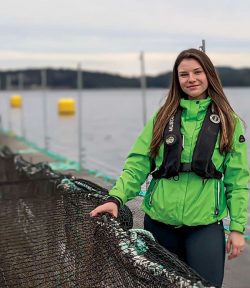
Kaitlin Guitard, water quality technician at Mowi, wonders what the future holds for her and the hundreds of British Columbians relying on the farmed salmon industry
SIDEBAR
Waiting for answers
Kaitlin Guitard would be the first to admit that her job as a water quality technician at a sea site farm isn’t a walk in the park. Exposure to all types of weather conditions is the norm, and “whether it’s wind gusts of a hundred km/hr or it’s raining and snowing, you’ve got to have that drive to be able to get out there every single day,” says the 24-year-old.
Still, she considers working at Mowi’s farm on Larsen Island in British Columbia “the best move” she’s made. More than the occasional sightings of dolphins, humpback whales or orcas that are part of the milieu, she says it’s the opportunity to do her part in creating a sustainable food future that resonates with her the most.
“When I was earning my degree in agriculture I learned about sustainable food production. That, and my love of animals, was my main reason for getting into aquaculture,” says the New Brunswick native.
Since moving to British Columbia two years ago, she has immersed herself not just in the province’s beautiful raw outdoors, but also in her coastal community.
“My whole life is this industry, at work and in my personal life. All of the connections that I’ve made, all of the friends that I’ve made are in this community. This is my life now.”
She now feels this stability is threatened by the Canadian Government’s decision to phase out 19 farms in the Discovery Islands in BC. While the farm site where Guitard works is not in the Discovery Islands, it is part of the salmon industry supply chain.
She explained that her worksite is a “specialized nursery.” “We get the fish as soon as they turn into smolts and we grow them until they’re about 500 grams, then we send the fish off to a larger farm where they will grow until they’re harvested. With us not having a site to send our fish to, we are could be forced into an early closure ourselves.”
“When I heard the news, I was concerned not only about those farms in the Discovery Islands and their employees, but all of our other operations and the employees in those operations. It’s going to have a huge ripple effect on all other areas of production for the company that I work for and for the our neighboring salmon companies as well,” she said.
“This industry is one of the last of its kind on the island that’s providing secure employment, providing all of the things that it does for individuals for local vendors,” she added.
She joins the 1,500 British Columbians directly relying on the farmed salmon industry for their livelihood in urging the federal government to reassess the decision.
“Why has all of the research and the science that has been done in the last little bit been disregarded?” she wants to ask Fisheries and Oceans Canada (DFO) Minister Bernadette Jordan.
“We as farmers and our hard work and our transparency have been disregarded here. And how come we haven’t heard a response yet? I know these things take time, but there are a lot of jobs on the line. There are a lot of families on the line right now and it just it feels like we’re really just kind of ignored.”
Advertisement
- U.S. researchers report advances in bonefish culture
- Biden urged to make local seafood production a priority
